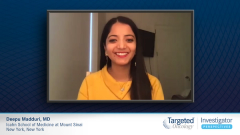
Unmet Needs in Triple-Class Refractory Multiple Myeloma
Deepu Madduri, MD, provides an overview of the treatment landscape for patients with triple-class refractory multiple myeloma.
Deepu Madduri, MD: In regard to the treatment landscape for patients with triple-refractory or relapsed multiple myeloma—meaning if they’ve progressed after an IMiD [immunomodulatory imide drug], a proteasome inhibitor, an anti-CD38 monoclonal antibody—we know, based on the MAMMOTH study, these patients have an overall survival rate of less than 9.2 months. This is why we need new, novel agents for the relapsed/refractory multiple myeloma population.
One of the things that we typically do when we have a patient who is triple refractory is we try to see if we can find a clinical trial to put them on. There are a lot of clinical trials underway exploring ways to address this exact patient population. These trials are looking at using bispecifics, and there are ADC [antibody-drug conjugate] trials as well as trials for CAR [chimeric antigen receptor] T-cell therapies.
Selinexor is approved for patients who are penta refractory, so even worse than triple refractory. We do offer selinexor for these patients. These patients can also get Blenrep [belantamab mafodotin], which has recently been approved. This is our first commercially available ADC. Patients are offered that as well.
In addition, like I mentioned, you could always do another autologous stem cell transplant. They can undergo an autologous boost if they can’t do a full transplant. So, there are various options. However, we know that we do need to get to the bottom of this and try to find a therapy that really works for these patients. We need something that gives them a longer progression-free survival.
These patients can get quite a few therapies. As you saw in some of the CAR T-cell trials that have been presented, or the bispecific data, these triple-refractory patients are getting up to 17, 18 prior lines of therapy. We can use various combinations of the approved and available drugs, and do combinations along with clinical trials that patients can participate in.
Transcript edited for clarity.


















